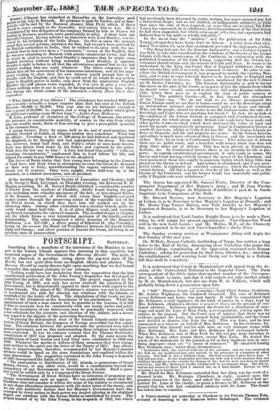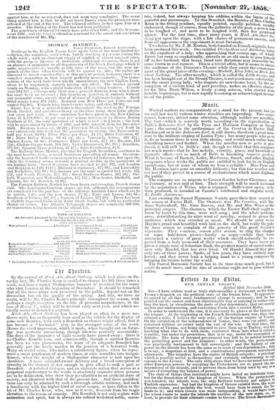POSTSCRIPT. SATURDAY.
Something like a manifesto of the intentions of the Ministry in res- pect to the Ionian Islands appears this morning in that eccentric but occasional organ of the Government the Horning Herald. The style, it will be observed, is peculiar, rising above the jog-trot style of the Herald, but not quite 'free from ma-English idioms and phrases. The Morning Herald so rarely throws light upon anything that we feel bound to transfer this natural curiosity to our columns.
"Nothing could have less foundation than the supposition that the late unauthorised publication of Sir John Young's despatches has developed or committed the policy of the Government. The project suggested by Sir i John Young, n 1857, not only has never received the sanction of the Government, but is diametrically opposed to their views with regard to the Ionian Islands. The object of Mr. Gladstone'a mission was not to discover or recommend any plan for altering our relations with the islands, as established by the treaty of Paris. The stipulations of that treaty are pre- scribed to Mr. Gladstone as the boundaries of his attributions. While the appointment of such a man cannot but be grateful to the Ionians, it is left to him to ascertain how far consistently with our treaty duties and privi- leges, the machinery of our intercourse may be practically improved, with a due solicitude for the interests and liberties of the islands, and a neces- sary regard to the dignity of the protecting Sovereign.
"In placing the independent state of the Ionian Islands under the pro- tection of Great Britain, the Congress of Europe prescribed but few condi- tions. The relations between the protector and the protected were left to mutual agreement, and on this understanding those relations have hitherto been conducted. It was by common consent that Sir Thomas Maitland's constitution of 1817 was proposed and adopted. By the same means the modifications of Lord Seaton and Lord Grey were established in 1848 and 1819. Whatever the merits or defects of these measures they were repug- nant neither to the spirit nor the letter of the Treaty of 1815. Any altera- tions or improvements, therefore, recommended by her Majesty's present advisers would be based on the same foundations and confined within the same dimensions. The suggestion contained in Sir John Young's despatch of 1857 transgressed the limits of the Treaty. 1` The annexation or distribution of the islands, as possessions of Great Britain, Greece, or any other state, would be a consideration beyond the competency of any Government or Governments to decide. Such a ques- tion could be settled only by a Congress of the Great Powers. " The Government of Great Britain have no intention of proposing any change necessitating such an appeal. We can confidently assert that Mr. Gladstone does not consider it within the scope of his mission to recommend in au! shape alterations inconsistent with the strict letter of the treaty, and we can also positively declare that her Majesty's Government have dis- couraged by every means in their power any project altering in the slightest degree our relations with the Ionian States as established by treaty. The project treated of by Sir John Young, in his despatch of 1857, but which had previously been discussed by public writer; has never nesernedira, a theoretical shape ; and we ere enibled, onipileputable ;telhOi'41.
that since the date of that despatch, on inotelitin one oceAgion,'b Young has expressed, in decidiktterms, his relinnuishment of the ftlen'educh he had then suggested, but WM& subsequent reflection and experience had induced him to lay aside as wholly infeasible."
In the mean time the "mission" and the publication of Sir John Young's despatches have borne fruit in Athens. A letter from that city, dated November 18, aays that excitement pervaded the diplomatic circles. "The King had sent for the ltussian Ambassador, and a Cabinet Council was held, to take into consideration the relations of the Greeks of the Ionian Islands with their countrymen of the Continent, in conjunction with the published despatches of Sir John Young, suggesting that the British Go- vernment should retain only the islands of Corfu and Pass. It seems to be understood by the King and Court that if England withdraws from the other islands they will of necessity be annexed to Greece. In order to con- ciliate the British Government it was proposed to modify the existing Min- istry, and to take in some Liberals known to be favourable to England and constitutional rule in Greece. The names mentioned for the new Cabinet are M. Dosios, Christides, &c. The Russian Ambassador is said to favour this move on the part of the Court, as in point of fact the islands from which we should retire would, annexed to Greece, fall under Russian influence. The writer then goes on to explain the state of public opinion in reece.] The patriotic Greeks—all, in fact, beyond the atmosphere of the Court—say, We do not wish to see Greece incorporate the Ionian Islands until we are free at home—until we see the Sovereign adopt an independent national and constitutional policy at home and abroad. Why, say the people, should we desire to see the Ionians under the rule of a Sovereign and Court who are anything but Greek ?' In fact, let us look at the condition of the Ionian Islands as compared with Continental Greece. Throughout the whole group under British rule roads have been made and other public works executed which have increased the value of land and made the people comnaratively prosperous. Land in Continental Greece is worth 4/. per acre, whilst at Corfu it fetches 20/. In the Ionian Islands we have no brigands, and life and property are secure. In the Ionian Islands, agriculture is much snore advanced than in Greece, and the merchants are richer. Now, let us look at Continental Greece. Five miles out of Athens there are no public roads, and a traveller with money about him dare not sleep three miles out of Athens. This has been proved at Pentelique, Kefissia, &e. In Continental Greece there is no security for life or pro- perty. As regards constitutional government, it only exists in name, the Queen and Court having entirely usurped the power of the Chambers, and even persecuted those who sought to maintain rights which King Otho was placed on the throne to defend. Agriculture is abandoned, and it any pros- perity exists, it originates in external commerce, which the Government cannot destroy. All this is known to Greeks of the Islands as well as the Greeks of the Continent, and the former would lose materially and politi- cally if English rule were withdrawn."
The Queen has appointed Mr. Samuel Petrie, Director of the Com- missariat Department of Her Majesty's Army ; and M. Jean Nicolas Eugene Melchior, Major du Regiment d'Artillerie h pied de la Garde Imperiale to be Companions of the Bath.
Mr. Edward Hurries, now Secretory to Her Majesty's Legation at Lisbon, is to be Secretary to her Majesty's Legation at Brussels ; and Mr. Henry Page Turner Barron, now Paid Attache to her Majesty's Legation at Brussels, is to be Secretary to her Majesty's Legation at Lisbon.
It is understood that Lord Justice Knight Bruce is to be made a Peer, when he will resign his present appointment. Vice-Chancellor Wood will be the new Lord Justice ; and Mr. Melbas, M.P., of the Chancery bar, is expected to be the new Vice-Chaneellor.---Daily .News.
The Sunday evening services at Westminster Abbey will begin the first Sunday of the new year.
Dr. M‘Hale, Roman Catholic Archbishop of Tuam, has written a long letter to the Earl of Derby, denouncing those Catholics who praise the Queen's College, complaining of the oppression exercised over Roman Catholice ; asking for protection for their lives, liberties, &e. ; attacking the establishment ; and warning Lord Derby not to bring in a Reform bill that shall be a mockery.
It is understood that Count de Montalembert will appeal from the de- cision of the Correctional Tribunal to the Imperial Court. The Paris correspondent of the Globe states that another number of the Correspon- dent is about to issue, and that it will contain net only another article by M. de Montalembert, but also one from M. de Falloux, which will probably bring down a prosecution upon him.
A "full" Divorce Court sat yesterday—Lord Chief Justice Cockburn, Mr. Justice Wightman, Sir Cresswell Cresswell. The case of Robinson venue Robinson and Lane, was part heard. It will be remembered that Mr. Robinson, a civil engineer, on the faith of entries in a diary kept by Mrs. Robinson, obtained a divorce a tumult et thoro, on the ground of con- fessed adultery. Robinson petitioned the Court for a dissolution of mar- riage and made Dr. Lane of Moor Park, a co-respondent, relying upon the entries in the journal. But the Court was of opinion that there was no' evidence against Dr. Lane, the journal' being inadmissible, and the Court now decided to dismiss him from the suit. This was done, and he was summoned as a witness on behalf of Mrs. Robinson. In his evidence, Dr. Lane stated that himself and his wife were on very intimate terms with Mrs. Robinson. Mrs. Lane and Mrs. Robinson had exchanged lockets. "When Mrs. Robinson was at Moor Park he did not pay more attention to her than to any other person there except Mrs. Lane. He denied the whole of the statements in the journal so far as they implicate him in any- thing improper—they are "a tissue of romances." He admitted kissing Mrs. Robinson once ; under these circumstances. "Is October 1855, she arrived with one of her servants, and she was received in the hall by my mother-in-law and myself, in the presence of a number of other persons. The hall is also a billiard room. On that occasion I gave her a kiss. I will tell you why. In the September previous my. wife and I were anxious that our children should go to the seaside for change of sir, but we were too busy to absent ourselves, and Mrs. Bobinson kindly volunteered to accompany them. She did so, and on her return to Moor Park I saluted her as I have stated. Except on that occasion I never kissed her."
Mr. Bovill for Mrs. Robinson contended that her diary was the work of a diseased brain. Mr. Montagu Chambers in reply, insisted upon the genuine character of the diary, and asked the court, although it had ac- quitted Dr. Lane of the charge, to grant a divorce to Mr. Robinson on the ground that his wife had committed adultery with Dr. Lane. The Court has taken time to consider.
A Court-martial sat yesterday at Chatham to try Private Thomas Tole, accused of deserting to the Russiana before Sebastopol. The evidence against him, so far as reported, does not seem very conclusive. ;The worst thing against hint is that he did not leave Russia when the prisoners were released at the end of the war. The released soldiers looked upon Tole as a deserter. The finding of the Court has not been published.
The gentlemen of Queen's County have subscribed 8501., and the Govern- ment 1501., and the total is offered no a reward for the arrest and conviction: of the murderer of Mr. Ely.



























 Previous page
Previous page